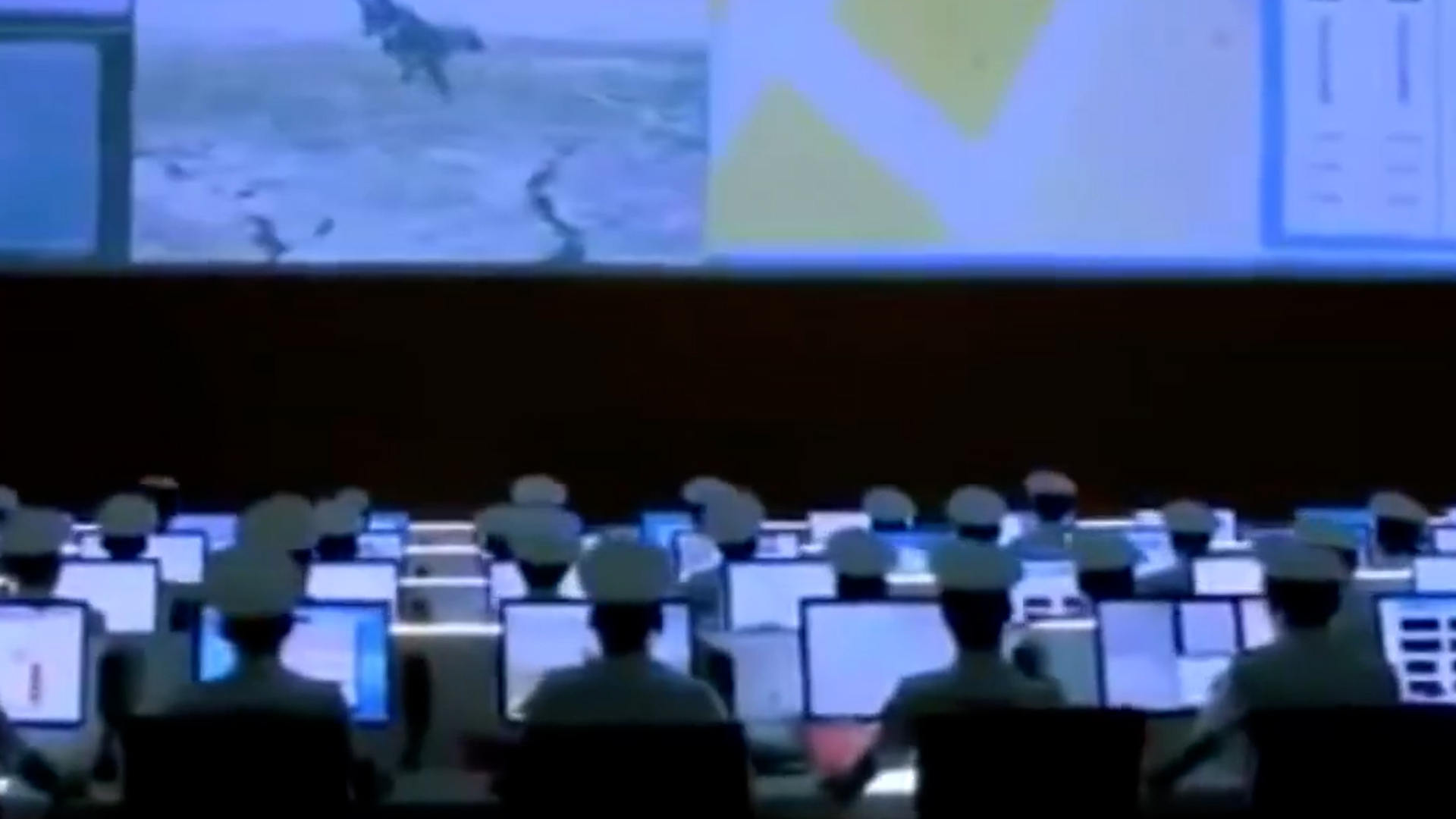
[RYAN ROBERTSON]
ONE OF THE GREAT THINGS ABOUT SOCIAL MEDIA–EVERYONE GETS A CHANCE TO WEIGH IN ON SOMETHING.
BUT, ONE OF THE ABSOLUTE WORST PARTS ABOUT SOCIAL MEDIA–EVERYONE GETS A CHANCE TO WEIGH IN ON SOMETHING.
THESE MAY COME AS A SURPRISE, BUT NOT ALL OPINIONS AND INSIGHTS ARE CREATED EQUALLY…SOME ARE MORE INFORMED;
CRAFTED IN THE CRUCIBLES OF EXPERIENCE AND CONTEXT.
RYAN MCBETH KNOWS ALL ABOUT THIS. HE SPENT 20 YEARS IN THE ARMY BEFORE BECOMING AN INTELLIGENCE ANALYST, SOFTWARE ENGINEER, AND YOUTUBE SENSATION.
I STUMBLED ACROSS MCBETH’S CONTENT A LITTLE AFTER THE START OF THE UKRAINE WAR
IT WAS A VIDEO DEBUNKING THE NOTION UKRAINE WAS BEING RUN BY NAZIS–A LIE PUTIN USED TO JUSTIFY HIS INVASION OF UKRAINE.
NOW, ASIDE FROM JUST BEING AN ENTERTAINING PRESENTER–
MCBETH’S VIDEOS STRUCK ME FOR ANOTHER REASON–THEY WERE FULL OF FACTS.
AS A JOURNALIST–IT WAS GREAT TO SEE ANOTHER TORCH BEARER FOR TRUTH TRYING TO SORT THROUGH ALL THE MISINFORMATION AND DISINFORMATION OUT THERE–
I HAD THE CHANCE TO TALK TO MCBETH RECENTLY–
WE COVERED A LOT OF GROUND AND SEVERAL HYPOTHETICAL SCENARIOS–
BUT WHAT I REALLY WANTED TO KNOW IS WHY HE WANTED TO GET INTO THE TRUTH TELLING BUSINESS IN THE FIRST PLACE.
RYAN MCBETH, REALLY APPRECIATE YOU TAKING THE TIME TO TALK WITH US TODAY. WHAT MADE YOUR CONTENT STAND OUT TO ME, RYAN, WAS YOUR JUST DESIRE TO SHARE TRUTH AND BEAT DOWN MISTRUTH AND DISINFORMATION. BUT BEFORE WE GET STARTED ON EVERYTHING, RYAN, IF YOU CAN FOR OUR AUDIENCE, I KNOW YOU HAVE A, YOU KNOW, 20-YEAR INFANTRYMAN CAREER KIND OF GIVE OUR AUDIENCE KIND OF A READER’S DIGEST VERSION OF YOUR OF YOUR CAREER PATH TO THIS POINT.
{Ryan McBeth // Intelligence Analyst}
“So, yeah, so I was an infantryman for 20 years. While serving, I got a a degree in computer science, and then I got a master’s in engineering management. And after I got out, I got a degree in MSC, Master MSc in cybersecurity, and I ended up doing working for the government, mainly doing what’s called CDs, cross-domain solutions. That’s where you take stuff from an area of low trust and push it up into an area of high trust, like if you have a drone feed, you know that when the footage enters the camera, technically, that camera isn’t on a secure network. So how do you take that information and put that information onto a secure network while making sure the information kflowing in doesn’t have any data that could allow us to be hacked? Then I worked for Accenture, doing something called C for ISR, Command Control, communications, computers, intelligence, surveillance, reconnaissance. Basically, we found bad guys, and once we found those bad guys, would give that information to our client, and our client would either continue surveillance or use more kinetic options to deal with the problem. So, while working for Accenture, I had a YouTube channel. It was mainly about software programming. And once the war in Ukraine kicked off, I started to do a couple of videos on cyber security in Ukraine and some videos from my anti anti tank experience. And my channel went from 5000 followers to 100,000 followers almost overnight. ”
[RYAN ROBERTSON]
WHEN YOU WHEN WE’RE TALKING ABOUT THE WAR IN UKRAINE, AND THAT’S WHAT KIND OF MAJOR YOUR SOCIAL MEDIA FOLLOWING BALLOON AND WHAT’S GOTTEN YOU TO THE POINT NOW, WAS IT THE THE NAZIS IN UKRAINE. DISINFORMATION VIDEO WAS, WAS THAT THE FIRST ONE THAT KIND OF BLEW UP FOR YOU? OR WHAT WAS THE FIRST ONE THAT LIKE, HEY, I GOT SOMETHING HERE.
{Ryan McBeth // Intelligence Analyst}
“So the first video that really blew up for me was a video that I did about why tank turrets pop off of their holes. I actually can’t tell you, I don’t know which was the first disinformation video. And I didn’t set out to become a disinformation expert, but I think that since I knew so much about the military and anti tank warfare, and I just, I kind of became an expert at going like, No, you’re wrong, and here’s why you’re wrong. It’s because tanks actually do this, or reactive armor actually works like this. And what I kind of noticed was that there was just so much disinformation out there about how the military works that by me kind of peeling back some of this stuff, I found more and more stuff. And I guess over two years, I kind of became like Forrest Gump, you know, Forrest Gump became a really good runner, because people were always chasing him. I became really good at finding disinformation agents because they were just freaking everywhere on the subject of Ukraine.”
[RYAN ROBERTSON]
OBVIOUSLY, THE THE VIDEOS ARE DOING WELL FOR YOU. SO THERE’S, YOU KNOW, AS A CONTENT CREATOR, YOU SEE THAT, AND YOU WANT TO GIVE THE AUDIENCE WHAT THEY WANT, RIGHT? BUT THE THE AUDIENCE FLOCKS TO THAT BECAUSE THERE’S A DESIRE FOR THAT, RIGHT? HOW IMPORTANT IN YOUR MIND IS THE DISINFORMATION, MISINFORMATION TAKE DOWN LIKE MISSION FOR YOU,
{Ryan McBeth // Intelligence Analyst}
“it’s it’s more important now than I think it was at the start of the conflict in Ukraine, mainly because one of the things that I realized doing my work is that information war is a weapon. Info DOM war. And one of the things I’ve done over the past year, since September of last year, is I have traveled around giving speeches about how information war is a domain of warfare. In fact, on the 10th I think I’m going to be in Ohio with the Ohio National Guard and all other Judge Advocate generals in the Ohio National Guard. They’re going to this one meeting, and I’m going to give a presentation where I’m going to try to convince them that we need to come up with a plan for treating information warfare practitioners as combatants. Because think about it like this. So let’s say, let’s say, um. Um, what? When you buy a drill, do you buy a drill because you want a drill, or do you buy a drill because you want a hole, because you want a hole, right? You don’t buy nobody collects drills, right? You buy a drill because you need a hole. So when you buy a weapon, you don’t really buy a weapon. To buy a weapon, you buy a weapon because you’re going to need the effects of that weapon. And the effects of that weapon might be to destroy a bridge, right? So a weapon is really an effector. So let’s say you want to prevent your adversary from crossing a bridge, you could use a weapon like a bomb or a cruise missile. Maybe you could use a cyber attack right, set a cyber attack and disable the electronic controls on the bridge so the toll gates won’t open or whatever. Or you could use information warfare to tell a bunch of weak minded college students to go shut down the bridge because of colonialist, imperialist, whatever. And we’ve already seen that when a bunch of students shut down a bridge, set down the Golden Gate Bridge in California, that was a weapon. Tiktok is a weapon. These students are motivated by Tiktok to shut down a bridge, and if the adversary can do that to a bridge. They can also say, if deterrence fails and China invades Taiwan, China had Taiwan has always been Chinese. This is colonialist, imperialist. The US is trying to take Taiwan for its own. You need to go to a naval base and glue yourself to a ship, and now you have an information warfare program working as a weapon system that is disabling a ship no different than a bomb can. How is that message being received? Well, I haven’t pulled all 150 and and usually I am very blunt when I’ve talked about how we need to kill these people, and when we start putting Hell fire missiles through people’s windows, or we start putting tea lambs into a into a an office building that’s being used as an Information Warfare Center, they’ll probably get the message. And usually, when people interview me about this, and I tell them that, and I’m very blunt, we need to kill these people, usually they go, oh my goodness, you know, like clutching their pearls, you’re gonna put a tea lamb through someone’s window, through some teenagers window, probably not a teenager’s window. There are other effects that you might be able to use. You might be able to use a cyber attack. There might be groundwork that you can do to take out critical parts of this operation. But we need to start considering information were to be a domain of war land. The land domain has been a domain of war ever since someone picked up a spear and said, I don’t like the way Thag is always in charge, right? And sea warfare has been a domain of war since the Peloponnesian War, where they were fighting on ships. And air has been a domain of war since we’ve had fighter planes, you know, World War One planes shooting at each other and well, now we have information war. Russia can’t defeat Ukraine by force of arms. They can’t they would have done it already. So how do you defeat Ukraine? Well, you can cut off their supply of arms. How does Russia do that? Well, they could use a weapon. They could bomb some of the factories in Germany and maybe use missiles on factories in the US. Well, that’ll cause a war. But if we use information war to convince people that Ukraine is corrupt, your money is getting thrown away. Vladimir Zelinsky, his wife, just bought a new Bugatti with your tax dollars, well, then we get people to call their congressman and say, I don’t want us sending money to Ukraine. And that stops the munitions just as easily as a bomb. We are at war right now, and these people who are using information warfare to affect as an effector, they need to be targeted.”
[RYAN ROBERTSON]
YOU’RE RIGHT… I MEAN…”
{Ryan McBeth // Intelligence Analyst}
“You’re acting like every other interviewer that is interviewing about this subject, where you don’t want to say, wow, you’re kind of right, but you’re also a psychopath. ”
[RYAN ROBERTSON]
WELL, I MEAN, I MEAN, YOU MIGHT BE, I DON’T KNOW, BUT NO, YOU BRING UP SOME, LIKE, STARTLING REVELATIONS, RIGHT? AND YOU BRING UP SOME, SOME POINTS THAT IT’S LIKE, LOOK, IF WE’RE, IF WE’RE BEING SERIOUS ABOUT WHERE THE WORLD IS HEADING, AND IF WE’RE BEING. SERIOUS ABOUT TRYING TO PREVENT THINGS. WE NEED TO BE SERIOUS ABOUT WHERE OUR ENEMIES ARE COMING FROM AND HOW THEY’RE COMING TO ATTACK US. SO I DON’T, I DON’T, I DON’T JUDGE THAT STATEMENT. YOU’RE THE 20 YEAR INFANTRY VETERAN, RIGHT? I’M NOT SO BUT IT, BUT IT IS STARK TO THINK ABOUT ALL THEY’RE DOING IS USING COMPUTERS TO TO POST MESSAGES OR, YOU KNOW, SOMETHING LIKE THAT. BUT IN THE 21ST CENTURY, I MEAN, THAT’S…
{Ryan McBeth // Intelligence Analyst}
“It’s a domain of warfare. And you know when, when someone blew up, when terrorists blew up the USS Cole, they did it on the water, and we didn’t go, oh, well, we can’t retaliate by air, because they did it on the water, right? So if somebody is using information warfare as an effector in cyberspace, why can’t we attack them through kinetic means, either on land or from the air? It’s a domain of warfare, and we cross domains of warfare all the time.”
[RYAN ROBERTSON]
HEY, RYAN, REALLY APPRECIATE YOUR TIME. AS YOU KNOW, FROM ONE JOURNALIST TO ANOTHER TRUTH BEARER, WANTED TO SAY, I APPRECIATE YOUR YOUR EFFORTS TO, YOU KNOW, SPEAK TO THE MISINFORMATION AND DISINFORMATION AND MAKE SURE THAT PEOPLE ARE GETTING THE RIGHT INFORMATION SO THAT THEY CAN MAKE EDUCATED DECISIONS ABOUT THEIR LIVES AND THOSE AROUND THEM, SO THANK YOU FOR THAT. THANK YOU FOR JOINING US TODAY. REALLY APPRECIATE IT,
{Ryan McBeth // Intelligence Analyst}
“Ryan, I had a great time. Thank you. You.”











